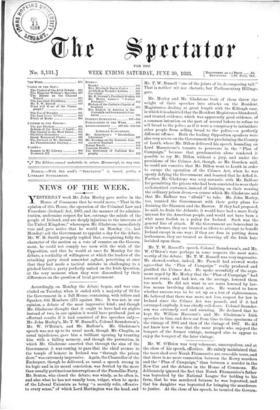Mr. Morley and Mr. Gladstone both of them threw the
weight of their speeches into attacks on the Resident Magistrates, dealing at great length with the Killea.gh case, in which it is admitted that the Resident Magistrates blundered, and treated evidence, which was apparently good evidence, of a common intention on the part of several bakers to refuse to sell bread to the police, as if it were a conspiracy to intimidate other people from selling bread to the police,—a perfectly different offence. Both the leading Opposition speakers were also very severe on the Government for proclaiming the County of Louth, where Mr. Dillon delivered his speech hounding on Lord Ma.ssereene's tenants to persevere in the "Plan of Campaign," because that proclamation alone rendered it possible to try Mr. Dillon without a jury, and under the provisions of the Crimes Act, though, as Mr. Goschen said, he could not conceive that Mr. Dillon went to Louth in order to escape the operation of the Crimes Act, when he was openly defying the Government and boasted that he defied it. Further, Mr. Gladstone was very sarcastic with Mr. Balfour for permitting the priests who had been convicted to wear their ecclesiastical costumes, instead of insisting on their wearing the ordinary prison dress,—a course which Mr. Gladstone said that Mr. Balfour was " afraid " to take. Mr. John Morley, too, taunted the Government with their petty plans for draining the Shannon and the Barrow. If they had proposed, he said, to drain the Atlantic, it would have had a more lively interest for the American people, and would not have been a whit more foolish as a policy for Ireland. Such was the general line of attack. If the Government are benevolent in their schemes, they are treated as idiots to attempt to benefit Ireland except in one way; if they are firm in putting down lawlessness, they are treated as deserving all the Irish hate lavished upon them.


















































